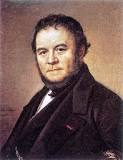The Red and the Black Page #20
Le Rouge et le Noir is a historical psychological novel in two volumes by Stendhal, published in 1830. It chronicles the attempts of a provincial young man to rise socially beyond his modest upbringing through a combination of talent, hard work, deception, and hypocrisy.
He was called at five o'clock on the following day and scarcely gave Madame de Rênal a single thought. He had accomplished his duty, and a heroic duty too. The consciousness of this filled him with happiness; he locked himself in his room, and abandoned himself with quite a new pleasure to reading exploits of his hero. When the breakfast bell sounded, the reading of the Bulletins of the Great Army had made him forget all his advantages of the previous day. He said to himself flippantly, as he went down to the salon, "I must tell that woman that I am in love with her." Instead of those looks brimful of pleasure which he was expecting to meet, he found the stern visage of M. de Rênal, who had arrived from Verrières two hours ago, and did not conceal his dissatisfaction at Julien's having passed the whole morning without attending to the children. Nothing could have been more sordid than this self-important man when he was in a bad temper and thought that he could safely show it. Each harsh word of her husband pierced Madame de Rênal's heart. As for Julien, he was so plunged in his ecstasy, and still so engrossed by the great events which had been passing before his eyes for several hours, that he had some difficulty at first in bringing his attention sufficiently down to listen to the harsh remarks which M. de Rênal was addressing to him. He said to him at last, rather abruptly, "I was ill." The tone of this answer would have stung a much less sensitive man than the mayor of Verrières. He half thought of answering Julien by turning him out of the house straight away. He was only restrained by the maxim which he had prescribed for himself, of never hurrying unduly in business matters. "The young fool," he said to himself shortly afterwards, "has won a kind of reputation in my house. That man Valenod may take him into his family, or he may quite well marry Elisa, and in either case, he will be able to have the laugh of me in his heart." In spite of the wisdom of these reflections, M. de Rênal's dissatisfaction did not fail to vent itself any the less by a string of coarse insults which gradually irritated Julien. Madame de Rênal was on the point of bursting into tears. Breakfast was scarcely over, when she asked Julien to give her his arm for a walk. She leaned on him affectionately. Julien could only answer all that Madame de Rênal said to him by whispering. "That's what rich people are like!" M. de Rênal was walking quite close to them; his presence increased Julien's anger. He suddenly noticed that Madame de Rênal was leaning on his arm in a manner which was somewhat marked. This horrified him, and he pushed her violently away and disengaged his arm. Luckily, M. de Rênal did not see this new piece of impertinence; it was only noticed by Madame Derville. Her friend burst into tears. M. de Rênal now started to chase away by a shower of stones a little peasant girl who had taken a private path crossing a corner of the orchard. "Monsieur Julien, restrain yourself, I pray you. Remember that we all have our moments of temper," said madame Derville rapidly. Julien looked at her coldly with eyes in which the most supreme contempt was depicted. This look astonished Madame Derville, and it would have surprised her even more if she had appreciated its real expression; she would have read in it something like a vague hope of the most atrocious vengeance. It is, no doubt, such moments of humiliation which have made Robespierres. "Your Julien is very violent; he frightens me," said Madame Derville to her friend, in a low voice. "He is right to be angry," she answered. "What does it matter if he does pass a morning without speaking to the children, after the astonishing progress which he has made them make. One must admit that men are very hard." For the first time in her life Madame de Rênal experienced a kind of desire for vengeance against her husband. The extreme hatred of the rich by which Julien was animated was on the point of exploding. Luckily, M. de Rênal called his gardener, and remained occupied with him in barring by faggots of thorns the private road through the orchard. Julien did not vouchsafe any answer to the kindly consideration of which he was the object during all the rest of the walk. M. de Rênal had scarcely gone away before the two friends made the excuse of being fatigued, and each asked him for an arm. Walking as he did between these two women whose extreme nervousness filled their cheeks with a blushing embarrassment, the haughty pallor and sombre, resolute air of Julien formed a strange contrast. He despised these women and all tender sentiments. "What!" he said to himself, "not even an income of five hundred francs to finish my studies! Ah! how I should like to send them packing." And absorbed as he was by these stern ideas, such few courteous words of his two friends as he deigned to take the trouble to understand, displeased him as devoid of sense, silly, feeble, in a word--feminine. As the result of speaking for the sake of speaking and of endeavouring to keep the conversation alive, it came about that Madame de Rênal mentioned that her husband had come from Verrières because he had made a bargain for the May straw with one of his farmers. (In this district it is the May straw with which the bed mattresses are filled). "My husband will not rejoin us," added Madame de Rênal; "he will occupy himself with finishing the re-stuffing of the house mattresses with the help of the gardener and his valet. He has put the May straw this morning in all the beds on the first storey; he is now at the second." Julien changed colour. He looked at Madame de Rênal in a singular way, and soon managed somehow to take her on one side, doubling his pace. Madame Derville allowed them to get ahead. "Save my life," said Julien to Madame de Rênal; "only you can do it, for you know that the valet hates me desperately. I must confess to you, madame, that I have a portrait. I have hidden it in the mattress of my bed." At these words Madame de Rênal in her turn became pale. "Only you, Madame, are able at this moment to go into my room, feel about without their noticing in the corner of the mattress; it is nearest the window. You will find a small, round box of black cardboard, very glossy." "Does it contain a portrait?" said Madame de Rênal, scarcely able to hold herself upright. Julien noticed her air of discouragement, and at once proceeded to exploit it. "I have a second favour to ask you, madame. I entreat you not to look at that portrait; it is my secret." "It is a secret," repeated Madame de Rênal in a faint voice. But though she had been brought up among people who are proud of their fortune and appreciative of nothing except money, love had already instilled generosity into her soul. Truly wounded as she was, it was with an air of the most simple devotion that Madame de Rênal asked Julien the questions necessary to enable her to fulfil her commission.
Translation
Translate and read this book in other languages:
Select another language:
- - Select -
- 简体中文 (Chinese - Simplified)
- 繁體中文 (Chinese - Traditional)
- Español (Spanish)
- Esperanto (Esperanto)
- 日本語 (Japanese)
- Português (Portuguese)
- Deutsch (German)
- العربية (Arabic)
- Français (French)
- Русский (Russian)
- ಕನ್ನಡ (Kannada)
- 한국어 (Korean)
- עברית (Hebrew)
- Gaeilge (Irish)
- Українська (Ukrainian)
- اردو (Urdu)
- Magyar (Hungarian)
- मानक हिन्दी (Hindi)
- Indonesia (Indonesian)
- Italiano (Italian)
- தமிழ் (Tamil)
- Türkçe (Turkish)
- తెలుగు (Telugu)
- ภาษาไทย (Thai)
- Tiếng Việt (Vietnamese)
- Čeština (Czech)
- Polski (Polish)
- Bahasa Indonesia (Indonesian)
- Românește (Romanian)
- Nederlands (Dutch)
- Ελληνικά (Greek)
- Latinum (Latin)
- Svenska (Swedish)
- Dansk (Danish)
- Suomi (Finnish)
- فارسی (Persian)
- ייִדיש (Yiddish)
- հայերեն (Armenian)
- Norsk (Norwegian)
- English (English)
Citation
Use the citation below to add this book to your bibliography:
Style:MLAChicagoAPA
"The Red and the Black Books." Literature.com. STANDS4 LLC, 2025. Web. 10 Mar. 2025. <https://www.literature.com/book/the_red_and_the_black_201>.








Discuss this The Red and the Black book with the community:
Report Comment
We're doing our best to make sure our content is useful, accurate and safe.
If by any chance you spot an inappropriate comment while navigating through our website please use this form to let us know, and we'll take care of it shortly.
Attachment
You need to be logged in to favorite.
Log In